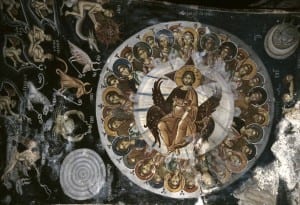Psalm 148

In this psalm of universal praise we see creation presented as a cosmic orchestra, where each of the three individual sections are called to lift up their distinct praise in harmonious melody. The first section praises God from the heavens: the angelic hosts, the sun, moon and stars. In times past they were the objects of worship, but here the psalmist tells us that there is someone higher than all these that deserves praise: the Lord, “for He commanded and they were created” (v 5).
This praise is unceasing as the angelic hosts continuously cry out, “Holy, Holy, Holy”. The sun praises God in its brilliance all day long, and when it sets the moon rises and continues praising God all through the night. The next harmonious section praises God from the Earth: the mountains, the depths, all trees and the forces of nature – namely fire, hail, snow, clouds and the stormy winds. Though these things do not have a voice to praise God, we are moved to praise God through them. The more we study the wisdom they were created with and see them “fulfilling His word” (v 8), by not crossing their boundaries and obeying the natural laws by which they were established, the more we understand that they too join the sounds of their own chords to the great voice of the heavenly choruses.
The third harmonious section consists of everything living: the sea creatures, beasts and cattle, birds and creeping things, and all classes of humans – kings, princes, judges, the young and the elderly. St Gregory of Nyssa explains that we, as humans, are a microcosm replicating all of creation within us. He submits that, “if the entire world order is a kind of musical harmony whose artisan and creator is God,” then we are called to a higher state of life, to echo the harmony of the cosmos, where the “varied, multiform virtues, imitate the harmony of the universe while [our] human nature acts as an instrument in rhythm with God’s melody” (On the Inscriptions of the Psalms Ch. 3, 9).
Source: Lychnos December 2019 – January 2020
